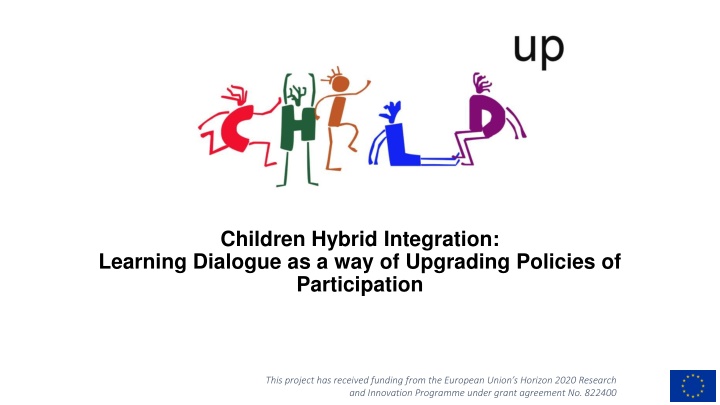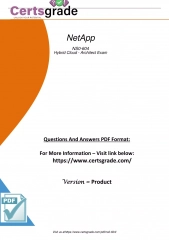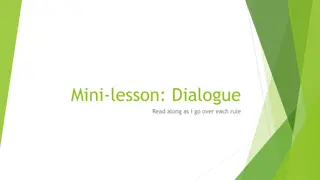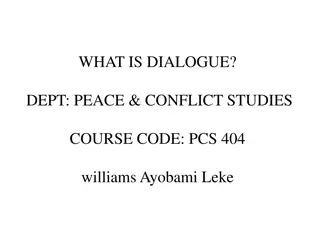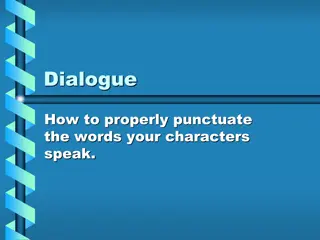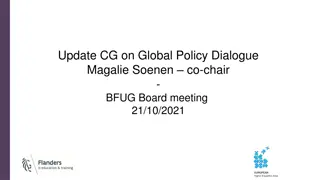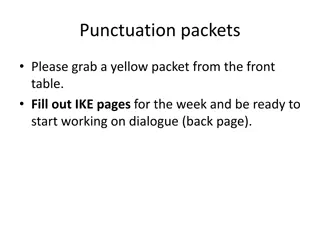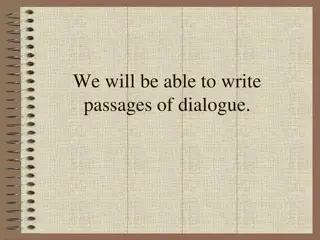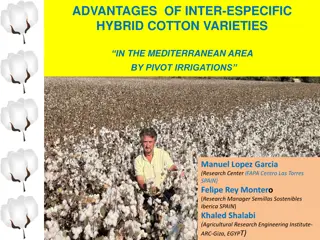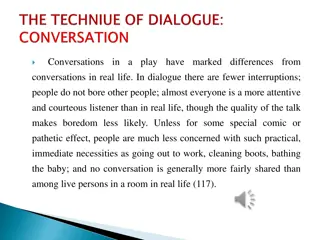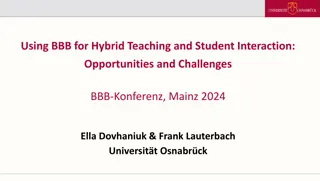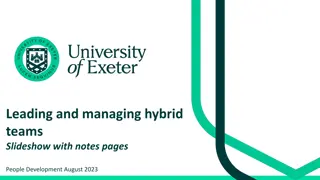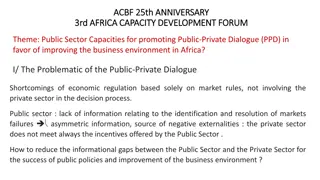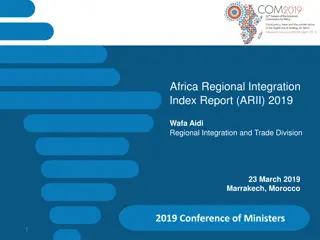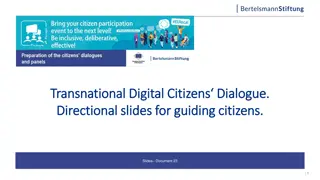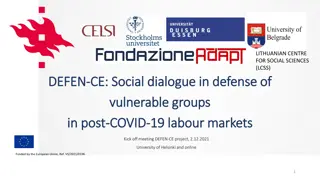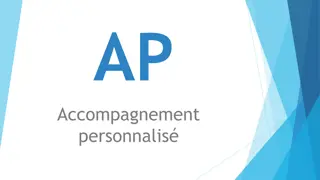Enhancing Children's Hybrid Integration Through Dialogue in Education
Presenting research results on enhancing children's agency and hybrid integration through dialogic interactions in school settings, specifically focusing on children with migrant backgrounds. The project aims to propose effective facilitation methods to support the participation of children with migrant backgrounds in the education system. It explores the concept of epistemic authority and the role of facilitation in upgrading children's rights and responsibilities in knowledge production. The study includes field research analysis of classroom activities across different educational levels.
Download Presentation

Please find below an Image/Link to download the presentation.
The content on the website is provided AS IS for your information and personal use only. It may not be sold, licensed, or shared on other websites without obtaining consent from the author.If you encounter any issues during the download, it is possible that the publisher has removed the file from their server.
You are allowed to download the files provided on this website for personal or commercial use, subject to the condition that they are used lawfully. All files are the property of their respective owners.
The content on the website is provided AS IS for your information and personal use only. It may not be sold, licensed, or shared on other websites without obtaining consent from the author.
E N D
Presentation Transcript
Children Hybrid Integration: Learning Dialogue as a way of Upgrading Policies of Participation This project has received funding from the European Union s Horizon 2020 Research and Innovation Programme under grant agreement No. 822400
CHILD-UP Consortium Coordinated by: Department of Studies on Language and Culture - University of Modena and Reggio Emilia (Italy) Partners: Universit de Liege (Belgium) Sein joki University of Applied Sciences (Finland) Zentrum f r Forschung, Weiterbildung und Beratung Evangelische Hochschule Dresden (Germany) Jagiellonian University Krakov (Poland) Malm H gskola (Sweden) University of Northampton (The United Kingdom) International Institute of Humanitarian Law (Italy) Federation des Regions pour la Recherche, l Education et la Formation (France) European School Head Association (The Netherlands)
General aims of this presentation 1. Presenting the results of research on school activities which aimed to enhance and support children s agency and hybrid integration through dialogic interactions, with a specific focus on participation of children with migrant background (CMB). 2. Proposing a reflection on methods of facilitation enhancing and supporting agency, dialogue and hybrid integration of CMB in the education system
Agency and epistemic authority In the education system, children s agency is shown by rights and responsibilities in producing knowledge, i.e. epistemic authority (Baraldi 2015, from Heritage & Raymond 2006; Raymond & Heritage 2005) From teachers rights and responsibilities to convey and evaluate knowledge (Luhmann 2002; Mehan 1979) to facilitation that upgrades children s epistemic authority
Recording of activities Classes 16 7 10 33 13 4 20 103 Recordings 23 26 26 68 13 11 40 207 Belgium Finland Germany Italy CHILD-UP Poland Sweden UK Total
Field Research Analysis of classroom activities in Nursery schools (5-6 y.o.), Primary schools (9-10 y.o.) Lower secondary schools (11-12 y.o.) Higher secondary schools (15-16 y.o.)
Recording of activities and types of schools Nursery Primary Lower secondary 4 Higher secondary 14 Belgium - 5 Finland Germany - 15 6 11 8 - 2 CHILD-UP 10 Italy Poland Sweden UK Total 17 - - - 27 15 1 2 40 84 19 12 7 - 61 17 - 2 - 35
Field Research Transcription of 93 extracts from recorded interactions To provide indications and suggestions about best practices and, to less extent, problems in facilitation of children s agency and hybrid integration. Almost all extracts include sequences in which CMB actively participate in classroom interactions.
General results Analysis of interactions shows: Forms of facilitation Mixed forms of facilitation Directive forms of facilitation Participated teaching
Excerpt 1 (Italy, nursery school) 1. FACm: Pay attention! well look at me you all because now begins the most difficult part where you need imagination. I ask you to speak one at a time when you have ideas raise your hand, and we share them together is that ok? The first question is this: we are pretending to be on a ship and going to this island (.) to make it a beautiful place, if you can, it must be the most beautiful place possible to live. What do you think are the first things you need to live well on this island? The first needs, the first things to think of, does anyone have any ideas? (.) of the needs we might have [of the 2. M6: building houses 3. FACm: for example M6 says as first needs build houses 4. M6: or else when it rains (..) you have to go to a place like the forest where it rains less 5. FACm: but building houses is certainly a need, F1 (..) 6. F1: you must have food 7. FACm: F1 says let's go find some food or you must have it somehow you must have it, F8 8. F8: we can find a treasure 9. FACm: she says while we are there we could also try to find out if there is a treasure. Let's hear F2, M5 and F4 in a row, F2 10. F2: we can drink 11. FACm: water?
Excerpt 1 (Italy, nursery school) (..) 12. F2: yes 13. FACm: you have to make sure you can drink, M5 14. M5: a shop so we can go and buy food. 15. FACm: you would also put a shop among the first needs: that we have (..) F4 16. F4: sleep 17. FACm: sleep says F4 18. F4: ((nods)) 19. FACm: So some a places to sleep, we have the house M6 was talking about before, and in the house there will certainly be a place to sleep too, M3 20. M3: and: we can (2) also eat spaghetti 21. FACm: so he starts to say we have food it has already been said that we needed food, and he starts to say however food can mean so many things let's be more precise and see what foods we want what foods we need and here it could [be 22. M4: [vegetables 23. FACm: he says vegetables see! he says spaghetti, let's go on with M8 24. M8: me I would eat: (??) 25. FACm: I understand, then let's do like this: the need for food is there, then you wil prepare a nice menu of the island, the basic things to eat on the island, let's go on with the first needs M2 26. M2: in the woods: it rains less but: you can get lost. 27. FACm: mh:: what can you do to not get lost on the island M2? 28. M6: we can bring the compass!
Excerpt 2 (Italy, primary school) 1. M3m: so in my opinion it means yes to be happy means this because (.) if I think I am accepted I am respected I am part of the group I am happy to be part of the group, I am happy not to be alone (.) as before but I am part of a group I can express myself- express my feelings, my desires, my ideas, that's what being happy in my opinion 2. F1m: raise her hand 3. FACf: ((it can t be seen but FAC gives her the floor)) 4. F1m: in my opinion, yes, however, happiness is not the only important emotion 5. FACf: happiness is not 6. F1m: the only important emotion because to move forward you need other emotions such as sadness and anger 7. FACf: Mh 8. F3: ((also with her hand raised)) in my opinion happiness is made precisely by respect and em:: by someone who accepts you for who you are, and: I mean in my opinion if these elements are not present, you ca: you cannot be happy (?) 9. M3m: so in my opinion yes because: you are happy when someone is polite to you, speaks well of you, and: expresses ideas of :: and: yours: your ideas, and: when: does not: does not make fun of you and he doesn't treat you badly (..) 10. FACf: all done? (.) Some doubts? (Missing turns 11-20)
Excerpt 2 (Italy, primary school) 21. M1: we are human and therefore it is normal to get angry and sad, but I do not think it serves to move forward in life 22. F1m: in my opinion yes because in life you cannot always be happy 23. M: yes not in that sense always happy and always cheerful but like anger if you are angry, it is as if (.) you were another person because you have the impulses, and: you isolate yourself because you are angry and you do not want to be with others and this it can also provoke: m: I don't know but bad things anyway. Even sadness same thing 24. F1m: yes b[ut 25. M3m: [and then 26. FACf: wait wait 27. M3m: and then if you are respected, if you are accepted why should you be angry? (.) Indeed I would be very happy (.) I am already accepted but in the first class when I was not yet accepted since I wa:s (.) of another color, I was sad, I played alone, but now that I have been accepted it is not that I'm sad, it's not that I'm angry, of course human beings get angry and sad, but if you are accepted if (you are a great thing) why do you have to be angry? Why are you sad? In fact you have to be- you have to be happy 28. F1m: yes but i don't say you have to be angry when you have to be accepted, when you have to be - when you are accepted you have to be happy, but I say to be angry and sad about: other topics, which then can make you happy later in life (2.0) 29. F2: in my opinion (..) 30. FACf: (?)
Excerpt 2 (Italy, primary school) 31. F2: in my opinion so: sometimes sadness helps you (.) because when you are sad a friend arrives and from that moment you feel happy 32. F3: in my opinion, you also need sadness for another thing maybe it is also like a friend but also learn how to get up from a sad thing alone, also believe in yourself more too (missing turns 33.35) 36. F5: I wanted to say the same thing but in my opinion and: for example when you are sad and: it makes you think and: you ask yourself questions, why am I sad? em: and then go to clarify maybe (..) 37. FACf: well it seems to me that you have managed to put the two thoughts together (.) that is not that we have excluded one thing or the other, (.) but we have accepted what she said that is and: it is important to be respected it makes you happy, but even in the moments when you are not happy because there may be a problem or because you are angry etc., you are respected even if your anger and sadness are accepted (..) I understand it correctly? 38. F1m: Yes 39. FACf: do you think it's okay in this sense? 40. F1m: yes yes
Excerpt 3 ( England, primary school) 19M3 a war a long time ago before this one. I think it was for less than 20 years and 1.5 million people died 20Tm but again, it's a war about natural resources by the sounds of things, and money. So what's driving this? 21M3 Money 22Tm Wanting more. Wanting more. Wanting more. What's that? 23Children Greedy 24Tm Greed can lead to war. If we all sort of shared, and found better systems, then would this happen? We say that, but then I give it all to a really nice year six class bunch, if you got it all and another group nothing, any of you would feel naughty? Nasty? 25F1 No 26Tm No. What did you simply try and do the best by yourself? 27ChD ((many voices overlapping, unclear)) 28Tm But if, what did I have in M1 group? 29M3 Anger 30F2 Frustration Mister? In my Afghanistan they tried to get, I think, resources or something, they said no but then it was
Excerpt 3 ( England, primary school) 19M3 a war a long time ago before this one. I think it was for less than 20 years and 1.5 million people died 20Tm but again, it's a war about natural resources by the sounds of things, and money. So what's driving this? 21M3 Money 22Tm Wanting more. Wanting more. Wanting more. What's that? 23Children Greedy 24Tm Greed can lead to war. If we all sort of shared, and found better systems, then would this happen? We say that, but then I give it all to a really nice year six class bunch, if you got it all and another group nothing, any of you would feel naughty? Nasty? 25F1 No 26Tm No. What did you simply try and do the best by yourself? 27ChD ((many voices overlapping, unclear)) 28Tm But if, what did I have in M1 group? 29M3 Anger 30F2 Frustration Mister? In my Afghanistan they tried to get, I think, resources or something, they said no but then it was
Excerpt 3 (England, primary school) 31 Tm 32F3 33Tm richer, poor countries getting poorer, and one poor country kept getting poorer and poorer and poorer to breaking point, and they couldn't agree on what to do next and the best thing to do for their resources, they started to argue, but really upset, which is basically the same as having a [civil 34M5 [war 35Tm Exactly the same as Sierra Leone 36M1 But they didn t have their independence taken. My mum told me that they got their independence in like 1970 something 37Tm Often, fledging countries, young countries, it happened in Kosovo, didn t it? So when parts of different countries (.) your brother taught me so much about that, by the way. Your brother, I'm an expert now. But when countries breakoff into smaller countries, they can then often be fighting over resources, land it's happened all over the world, but sort of, Israel and Palestine 38M6 yeah, they had a war 39Tm They have been at war for ages over who owns which bit of the country. Kosovo and Serbia...There was a big war there. We are talking millions of people dying a resources, land and money, aren't we? When you get land you get more 40F5 Money 41Tm And? 42ChD Resources 43Tm Exactly. Yep. Anger, frustration and fighting. Fighting, interestingly, in a poor country, [civil [war Can you see how it plays out? Are any of you sitting there going Oh my goodness ? I had rich countries getting
Excerpt 4 (England, primary school) 1 Tm the poem, it's saying , even though I'm old , I still need to talk to 2 F1 someone 3 Tm You don't have to say this if you don't want to, but who has a grandparent in the room, still? [Grandparents 4 F1 grandma. 5 Tm Now, elderly relatives or anyone. Do you think you talk to them enough? 6 F1 No, but I haven't seen them in like 2 years 7 M1 No, because of Covid 8 Tm Yeah, but do you like talk to them on the phone? 9 Tm I can t hear everyone, so let s go around the room. M1 do you talk fairly regularly? 10 M1 I can't come up because I'm not French 11 Tm Hey, do they speak French? But I want to ask you this, right? Because this had a real effect on people last year. Going back to the context of [I do. I have a
Excerpt 4 (England, primary school) 12 M1 13 Tm you trying to get off the phone do you think? 14 M1 I speak to them for 9 to 10 minutes 15 F1 Sometimes, because I haven't spoken to them in a long time, the last time I saw them I had grown engrain. I think it was like three years ago , and I haven't spoken to them come out or I think I have , I think it was like last year. But it was like 20 minutes long that conversation 16 Tm Because what it s saying is, people see people sometimes that are elderly 17 F1 Some people don t wanna talk to them. They find them annoying, some people 18 Tm Why? 19 F1 Because they just keep asking too many questions 20 F2 They are not your generation, so they don t understand things that you like 21 Tm Ok. So a lot of people see older people and go oh, you don t understand me, I m a child, you re 60, 70, 80, not everyone, I m not saying everyone. But I think it s fair to say that some people think that, yeah? 22 F2 Yeah, sometimes 23 Tm Sometimes, but, what this poem is saying, is that I was once. Yeah but not just friendly, I have experiences that you ve had you might have your Xbox, but all you re doing is playing. Did they play when they were younger? = My dad calls them and then I talk And when you talk to them , and again this is an honest thing, are you engaged in long conversations, or are
Excerpt 5 (Italy, secondary school) 1. F6: I'm going, I've finished 2. FAC2f: go go go go F6 (2.0) 3. F6: so well ((show the drawing)) so practically there is an important date 2017 which is when I met my best friend, (..) then there is a house which is in Manila, with three people which would be my grandparents and me, who: practically they are: the most important people, because they are like a- like my family like my second family like parents, because they raised me as a child so for me hh they are parents, 4. FAC2f: sure 5. F6: e:m: then well there is a heart that: means that for me they are: family is the most important thing the thing that comes first, (3) ah: ((smiles)) nothing m:: I finished 6. FAC2f: ok no no, you have been very clear, therefore the family, also the grandparents, because they are all those who have been close to you and have helped you to grow up. 7. F6: yes 8. FAC2f: including [also 9. F6: [yes the people who have always been close to me in the difficult moment I mean in fact my best friend has been a very important person who has always been close to me always always so for me she is the sister that I m: a sister that I lost when I was little so, she was practically my twin sister that I lost, so she is like my sister because she has always been close to me and she supports me in everything 10. FAC2f: she's very precious it's very nice 11. F6: mh mh 12. FAC2f: thank you Ana thank you for [sharing even the most difficult things 13. F6: [you're welcome
Forms of facilitation Combination of: (a) questions children s points of view) (b) formulations which summarise, make explicit or develop the gist of children s narratives/contributions (c) minimal feedback showing listening and attention and favouring the fluidity of conversations. enhancing participation (showing interest in Two sub-forms (or phases): (1) Questions and formulations supporting children s agency (2) Minimal responses allowing children to take the floor continuously
Mixed and directive forms of facilitation Mixed forms add adults guidance to facilitation: They are based on adults expanded turns of talk which provide comments or explanations about relevant and positive meanings produced by children. Directive forms include adults more frequent, or systematic, comments and explanations, recommendations. combined to normative They decrease the potential for upgrading children s epistemic authority. Teachers/facilitators provide relevant knowledge for children, establishing adult authority in the classroom.
Participated teaching Teacher s superior epistemic authority, shown by their questions which aim to guide children s answers and to scaffold these answers. Children generally align with teachers orientations When children do not align, teachers tends to avoid negative sanctions.
Some notes on distribution Forms of facilitation: more frequent in higher secondary schools, above all in Italy and in primary schools (facilitators external to schools) Mixed and directive forms of facilitation: frequent in nursery schools in which children are more frequently seen in need of guidance for their less fluent participation in conversation and ability in participating in dialogue. Participated teaching: more frequent in lower secondary schools, above all as second language teaching.
Fluency Fluency in use of language: problem for several CMB. When CMB were not fluent, it was more difficult to upgrade their epistemic authority and to involve them in dialogue. In second language teaching: three modes (bib) of teaching second language (materials, improvement of skills and classroom context). Facilitation was more probable in the classroom context mode, encouraging the production of children s narratives and cultural and intercultural issues
Interactions between children Autonomous interactions between children in workshops were not rare (Germany, Italy, Sweden), but it was but difficult to record them. Recordings was possible in Germany and Sweden. Complete autonomy in managing interactions was not possible, since workshops were based on tasks assigned by the teachers. Different outcomes, based on different assigned tasks.
Childrens evaluation Classroom interaction was evaluated positively by 68.9% of participants (80.4% of adolescents) and negatively only by 7%. No substantial differences of gender and migrant/non-migrant background. For ethical reasons, it was not possible to associate evaluations to single activities. However, focus group interviews showed that children were able to identify relevant aspects of facilitation and to distinguish between more successful and less successful forms.
Conclusions Our analysis shows that: Some facilitative actions can be particularly relevant in enhancing and supporting (migrant) children s agency and production of narratives Different forms of facilitation make a difference for children s agency and production of narratives Facilitation is not only effective from the standpoint of researchers but also from that of children
